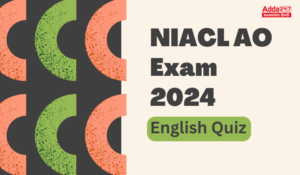
IBPS
PO Prelims is in its way and lot of aspirants are heading towards new
hopes with this upcoming opportunity. Thus, English Language can be an
impetus for their success by saving time and scoring well. So, instead
of boiling the ocean, try building up a strong vocabulary, an effective
knowledge of grammar, and efficient comprehension skills so as to be on
the ball to face this particular section. Here is a quiz on English
Language being provided by Adda247 to let you practice the best of latest pattern English Questions for upcoming IBPS PO exam.
The continuous depreciation in the Indian rupee and the overall risk aversion towards emerging markets has made foreign portfolio investors (FPIs) wary of the Indian equity market with the current month witnessing outflows in excess of Rs.12,000 crore in five trading sessions. While the month has just begun, the pace at which overseas investors are selling shares in the Indian market could make the current month one of the worst-ever in terms of foreign money outflows. (A)
The intensity of the selling spree can be further gauged from the fact that in the last 16 years, since 2002, there have been only five instances of FPIs selling shares worth more than Rs. 12,000 crore in a single month. Incidentally, the last time FPIs sold over Rs. 12,000 crore in a single month was in August 2017 when such investors were net sellers at Rs. 12,770 crore.
Market participants attribute the outflows to the record fall in the Indian rupee combined with the overall weakness in the emerging equity markets with the rising interest rates in the U.S. acting as a catalyst. While a rise in the interest rate in the U.S. market makes investing in emerging markets less attractive, currently the rates in U.S. at about 3.2% are at a multi-year high.
“The fall in the Indian rupee is the single largest factor affecting foreign flows in the Indian market,” said the head of the institutional desk of a domestic brokerage. “While the outflow from the Indian market is a part of the overall aversion towards emerging markets, it would continue till the rupee sees some amount of stability. (B) The near future, however, is expected to see more outflows as other global and domestic macro-economic factors stabilise as well,” he added. The Indian rupee is the worst performing Asian currency in the current calendar year, having fallen more than 15% in 2018.
Foreign investors are net sellers at Rs. 25,321 crore in the current calendar year, which has seen some months of heavy selling earlier as well by FPIs, who have historically been looked upon as the prime drivers of any bull run in the Indian market. In February, FPIs were net sellers at Rs. 11,423 crore. In May and September, FPIs sold Indian shares totalling Rs. 10,060 crore and Rs. 10,825 crore. The highest-ever single month selling by foreign investors at Rs. 18,244 crore was seen in November 2016.
Q1. Which of the following is NOT INCORRECT according to the passage?
Solution:
The statement in option (d) refers to the first two lines of paragraph 2. Hence, (d) is the correct answer here.
Solution:
Solution:
STIMULATOR: Something/someone that make (something) more active; Something/someone cause or encourage (something) to happen or develop.
ENCUMBRANCE: Something that causes problems or difficulties for someone or something.
Solution:
Now, ‘till’ refers to a point in time when the rupee stabilises. Therefore usage of ‘unless’ is wrong as it would refer to the ‘condition’ of rupee seeing some amount of stability. Whereas, usage of ‘until’ is absolutely fine here as it is synonymous with ‘till’.
Therefore, option (b) is the correct answer here.
Solution:
Solution:
Hence clearly, all the words given in the options are synonymous with ‘Wary’. Therefore, ‘none of these’ is the correct answer choice here.
Solution:
Hence, statement (a) can be mentioned from the original statement.
(A) Optimistic thinking is leading people to set up businesses that have no realistic prospect of financial success, according to a study which has found that pessimists are less likely to proceed with unpromising entrepreneurial ventures.
(B) Many of the optimists would have been well advised to remain an employee, according to the study published in European Economic Review.
(C) Despite entrepreneurs earning on average less, working longer hours and bearing more risk than their counterparts in paid employment, optimists are more likely than most to mistakenly think they have found a good business opportunity and that they have what it takes to exploit it successfully.
(D) Tracking individuals as they move from paid employment to setting up their own business venture, the study found that business owners with above average optimism earned some 30% less than those with below average optimism.
(E) The research from the University of Bath, the London School of Economics and Political Science, and Cardiff University in the U.K., explores the financial consequences of becoming an entrepreneur for optimists.
Q8. Which of the following will be the FIFTH (last) sentence of the corrected arrangement?
Solution:
Optimistic thinking is leading people to set up businesses that have no realistic prospect of financial success, according to a study which has found that pessimists are less likely to proceed with unpromising entrepreneurial ventures. The research from the University of Bath, the London School of Economics and Political Science, and Cardiff University in the U.K., explores the financial consequences of becoming an entrepreneur for optimists. Tracking individuals as they move from paid employment to setting up their own business venture, the study found that business owners with above average optimism earned some 30% less than those with below average optimism. Many of the optimists would have been well advised to remain an employee, according to the study published in European Economic Review. Despite entrepreneurs earning on average less, working longer hours and bearing more risk than their counterparts in paid employment, optimists are more likely than most to mistakenly think they have found a good business opportunity and that they have what it takes to exploit it successfully.
Hence the correct order of rearrangement is, EDBC and ‘C’ will be the LAST sentence.
Solution:
Optimistic thinking is leading people to set up businesses that have no realistic prospect of financial success, according to a study which has found that pessimists are less likely to proceed with unpromising entrepreneurial ventures. The research from the University of Bath, the London School of Economics and Political Science, and Cardiff University in the U.K., explores the financial consequences of becoming an entrepreneur for optimists. Tracking individuals as they move from paid employment to setting up their own business venture, the study found that business owners with above average optimism earned some 30% less than those with below average optimism. Many of the optimists would have been well advised to remain an employee, according to the study published in European Economic Review. Despite entrepreneurs earning on average less, working longer hours and bearing more risk than their counterparts in paid employment, optimists are more likely than most to mistakenly think they have found a good business opportunity and that they have what it takes to exploit it successfully.
Hence the correct order of rearrangement is, EDBC and E will be the SECOND sentence.
Solution:
Optimistic thinking is leading people to set up businesses that have no realistic prospect of financial success, according to a study which has found that pessimists are less likely to proceed with unpromising entrepreneurial ventures. The research from the University of Bath, the London School of Economics and Political Science, and Cardiff University in the U.K., explores the financial consequences of becoming an entrepreneur for optimists. Tracking individuals as they move from paid employment to setting up their own business venture, the study found that business owners with above average optimism earned some 30% less than those with below average optimism. Many of the optimists would have been well advised to remain an employee, according to the study published in European Economic Review. Despite entrepreneurs earning on average less, working longer hours and bearing more risk than their counterparts in paid employment, optimists are more likely than most to mistakenly think they have found a good business opportunity and that they have what it takes to exploit it successfully.
Hence the correct order of rearrangement is, EDBC and B will be the FOURTH sentence.
Q11. Are you planning a family getaway to Kerala? India’s ___11___ paradise attracts thousands of tourists every year seeking solace and a ___12___ retreat in the lap of nature. However, on a holiday with kids, the focus shifts on the preferences and likes of the little ones. So, while you can spend hours ___13___ the ceiling of a cathedral in Kerala or say, stealing moments of relaxation and quietude at an Ayurvedic spa, chances are that all your dreams will fall flat if you do not have enough planned out for your kids. ___14___, Kerala has plenty of stuff for all age groups to enjoy! Every time I travel to Kerala, I am swept off by the sight of its ___15___ beauty and well-maintained cities and towns.
Solution:
Therefore, the correct answer choice here is, ‘tropical’.
Solution:
Therefore, ‘rejuvenating’, which means refreshing, is a perfect fit for the given blank. It makes the sentence grammatically correct & meaningful and coherent.
Solution:
Solution:
Hence, option (d) is the correct answer choice here.
Solution:
‘Lush’ means - lavishly productive; or, appealing to the senses.
- Tips and Tricks To Solve Reading Comprehension
- Tips and Tricks to Solve Coherent Paragraph| Odd Sentence out
- 5 Tips and Tricks To Solve New Pattern Cloze Test





 Practice for English Section: 15 Cloze T...
Practice for English Section: 15 Cloze T...
 Bank Exams के लिए Error Correction, Gram...
Bank Exams के लिए Error Correction, Gram...
 English Quiz For NIACL AO Mains 2024 Exa...
English Quiz For NIACL AO Mains 2024 Exa...










